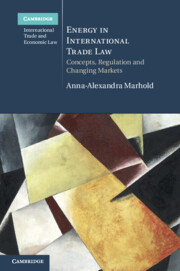Book contents
- Energy in International Trade Law
- Cambridge International Trade and Economic Law
- Energy in International Trade Law
- Copyright page
- Dedication
- Contents
- Tables
- Foreword
- Acknowledgements
- Tables of Cases
- Acronyms and Abbreviations
- Introduction and Objectives
- Part I Energy in International Trade Law: Concepts, History and Legal Framework
- Part II International Trade Law and Changing Energy Markets: Decentralization, Decarbonization and Energy Security
- 5 Decentralizing Energy Markets in the Light of International Trade Law: OPEC and the EU Internal Energy Market
- 6 Decarbonizing Energy Markets: Constraining Dual Pricing and Options for Fossil Fuel Subsidy Reform in the WTO
- 7 The Emerging Concept of Energy Security in International Trade Law
- 8 General Conclusion and Recommendations
- Bibliography
- Index
8 - General Conclusion and Recommendations
from Part II - International Trade Law and Changing Energy Markets: Decentralization, Decarbonization and Energy Security
Published online by Cambridge University Press: 24 June 2021
- Energy in International Trade Law
- Cambridge International Trade and Economic Law
- Energy in International Trade Law
- Copyright page
- Dedication
- Contents
- Tables
- Foreword
- Acknowledgements
- Tables of Cases
- Acronyms and Abbreviations
- Introduction and Objectives
- Part I Energy in International Trade Law: Concepts, History and Legal Framework
- Part II International Trade Law and Changing Energy Markets: Decentralization, Decarbonization and Energy Security
- 5 Decentralizing Energy Markets in the Light of International Trade Law: OPEC and the EU Internal Energy Market
- 6 Decarbonizing Energy Markets: Constraining Dual Pricing and Options for Fossil Fuel Subsidy Reform in the WTO
- 7 The Emerging Concept of Energy Security in International Trade Law
- 8 General Conclusion and Recommendations
- Bibliography
- Index
Summary
The findings of this book reveal that at the multilateral level there is a pressing need for rules that address the realities of cross-border trade in energy and tackle energy trade regulation in a proper and proactive manner. The concluding chapter therefore offers suggestions for enhanced energy governance from an institutional angle. It explores this question at three levels. First, it discusses the pros and cons of the WTO as a forum for tackling energy issues more proactively. It then contemplates possible scenarios for interaction between the WTO and the ECT for that purpose. Lastly, it briefly considers the possibility of innovating energy regulation through PTAs.
Keywords
- Type
- Chapter
- Information
- Energy in International Trade LawConcepts, Regulation and Changing Markets, pp. 265 - 283Publisher: Cambridge University PressPrint publication year: 2021

